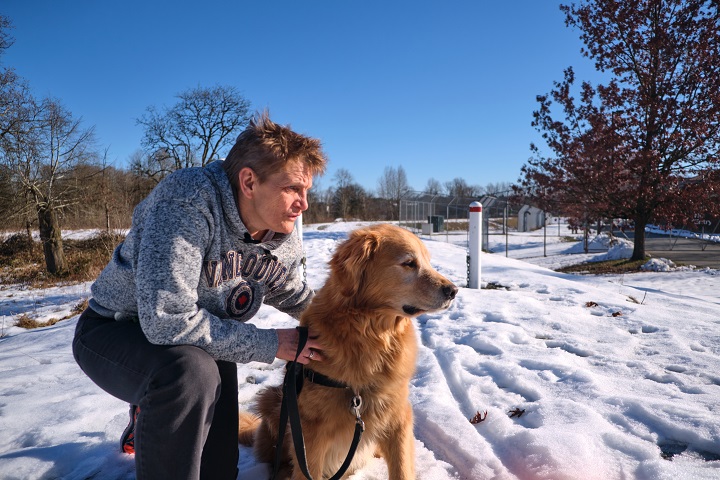Dexter is the therapy dog at the hospital, where he helps some of the most vulnerable people in the province. He’s a nine-year-old golden retriever with kind eyes and a naturally calming demeanour.
Sindey Mehlhorn, who cares for Dexter full-time and acts as his handler at the hospital, trained him for his role from the age of nine weeks.
“From when he was a puppy, I exposed him to loud noises and different experiences that might frighten other dogs, and now he’s chilled out all the time—nothing fazes him.”
“Part of my role is helping the patients with exercise and physical activity, which is an important part of helping people get healthy and helping them to take care of themselves,” says Sindey.
“Sometimes we have patients who struggle to get the motivation to exercise. One of the fun things Dexter can do is walk on a treadmill so we have him hop on one treadmill and the patient hop on the other. One of our patients absolutely loves this, and it gives her drive to exercise where she didn’t have it before.”
The patients at the hospital have extremely complex mental health and substance use issues. Before arriving, they have often struggled to connect with mental health services. This pattern of falling through gaps in the system and lack of support to address underlying issues is often part of the reason they end up in the hospital in the first place.
Dexter’s role as a therapy dog ranges from helping patients get engaged in activities and therapies related to their treatment to simply being a much needed, comforting presence. Similarly, Dexter can turn a simple activity like walking around the yard into something with meaning and purpose.

“Saying to a patient, ‘Let’s go walk Dexter,’ is so much more interesting than going for a walk for no reason,” Sindey continues.
“Patients here see him as a friend. A safe companion they can hug, touch and show and receive affection with, which is something that many of them have been missing.”
A history of trauma is something that many patients at Forensic Psychiatric Hospital have in common. Sindey points out that the women living there tend to have even more traumatic than average experiences in their pasts.
“Therapy dogs are a real help to this group of patients by providing unconditional acceptance and affection based solely on their current actions, and without judging what might have happened in the past,” says Dr. Heather Fulton, a psychologist at BC Mental Health and Substance Use Services.
“We have one female patient whose first language isn’t English, and nobody else here can speak it,” says Sindey. “Sometimes she just speaks to Dexter. It’s a chance for her to speak her native language to someone completely willing to sit there and just listen without judging.”
Dexter has also directly impacted patients’ care by allowing them to open up and engage in treatment in ways they haven’t before.
“We had a patient who wouldn’t talk to his doctor for three years,” says Sindey. “One day we brought Dexter into the appointment, and just having him there as a distraction and someone else to talk to helped him to communicate with his doctor for the first time.”
Many patients at the hospital have difficulties with trust after being treated differently by society due to their mental health challenges. Dexter is a comfort to them by simply being a happy-go-lucky dog and helping them feel less stigmatized and judged.
“Dexter doesn’t react negatively to people who behave differently,” says Sindey. “He’s a great equalizer in that way. It doesn’t matter who you are—he’s going to treat everyone he meets in the same way.”
For a patient, connecting with a therapy dog can also mean developing a strong and trusting relationship with the staff working with him by association.
“Meaningful relationships between patients and staff can help with developing successful and lasting treatments,” says Heather.
Working at Forensic Psychiatric Hospital means helping with people who have often continually fallen through gaps in the system and experienced the worst days of their lives. Staff go above and beyond to help these people in an often difficult environment, and therapy dogs can also be can a comfort to them.
“In one particularly emotional staff meeting, I saw Dexter walk around to each person who spoke and just sit with them,” says Peri Hanzouli, an occupational therapist at the hospital. “He seemed to recognize that people needed comfort and wanted to check they were okay.”
It’s clear the impact Dexter has on patients and staff is huge, and that he and Sindey share an immense bond through their mutual calling at the hospital. Sindey jokes, “Dexter is the only one working here without a proper job description; he just always seems to know what people need. Plus he’s very cheap to employ. He only expects to be paid in dog treats.”
